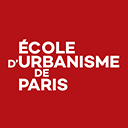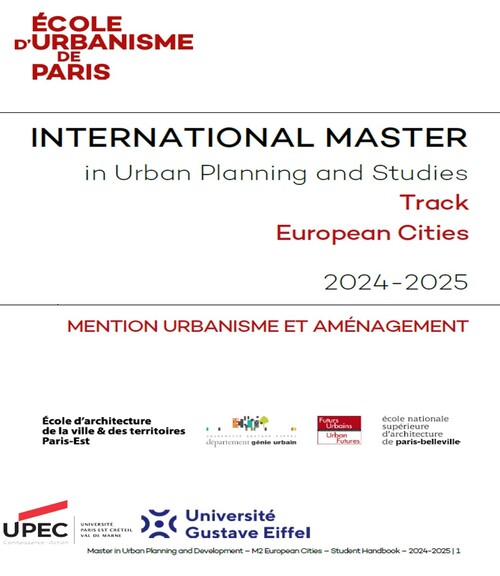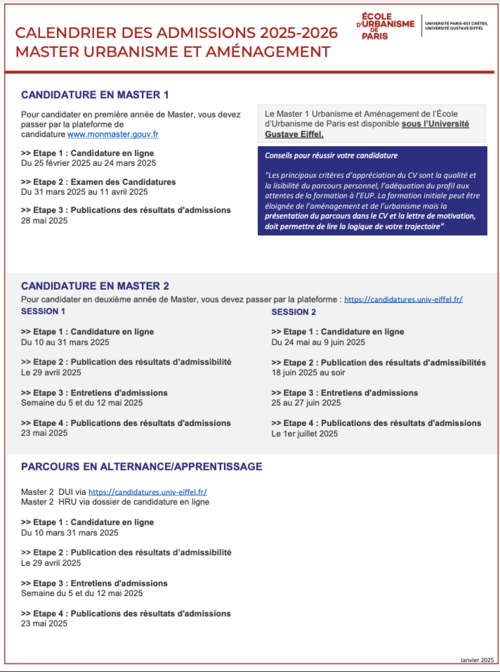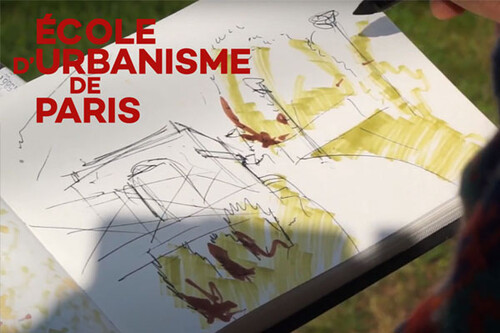International Master in Urban Planning and Studies
Master in Urban Planning and Development - International Master in Urban Planning and Studies (Master 2 Urbanisme et Expertise internationale), Track 'European Cities' / Track 'Urbanisme et villes des Suds' (Urban Planning and Cities of the Global South). Left: Paris, Rosa Parks district, 2017 © EUP. Right: Saint-Laurent du Maroni, Chekepatty district, 2018 © EUP.
About
This International Master in Urban Planning aims to prepare graduate students for work on urban planning and other urban policy issues in both international and domestic organisations requiring strong expertise in international and/or European urban issues.
The programme is divided into two tracks:
▪ "European cities" (entirely taught in English, and formerly known as "Urban Regeneration and City Planning in Europe"),
▪ "Villes des Suds" ("Cities of the Global South", taught in French).
The programme welcomes students from all over the world, whose experiences contribute to enriching the learning process.
Created to foster international mobility, the programme is defined by its modules taught entirely in English and by its strong collaboration with foreign universities, international bodies and agencies. During the year, students will acquire conceptual, practical and methodological skills enabling them to understand and tackle the main challenges of globalising cities and metropolises. Emphasis is placed on developing the capacity to analyse and compare globalising cities across the world. At the end of the year, students will have gained skills and professional knowledge in urban planning that are tailored for both the public and private sectors, and for international projects, policies and organisations.
Targeted Skills
The main skills, knowledge and competencies developed during the programme are as follows:
▪ Knowledge and expertise on urban policies and planning practices in European countries and in Emerging countries/countries of the Global South.
▪ Ability to produce urban analysis and to make recommendations on the scale of globalised metropolises.
▪ Capacity to analyse, compare and deal with planning systems in their diversity.
▪ Knowledge about the development, management, monitoring and evaluation of internationally financed urban projects (including European Union).
▪ Communicating and working in English-speaking environments as well as in multilingual environments.
▪ Working in a multicultural context.
This programme actively encourages students to spend time abroad – in the form of either an internship or a semester at a foreign university.
Find out more about the mobility in International Master in Urban Planning – European cities.
Professional Prospects
This programme covers the different levels of urban planning skills (analysis, strategy, planning, project, management). Henceforth, professional opportunities cover the wide range of professions in the field of planning, such as project management, design, urban management, urban analysis, integrated project, mediation, etc.
In addition, the international master programme offers specific professional opportunities, both at the national and international levels:
▪ In Europe: Local planning authorities and governments, European agencies, Architecture and planning agencies, International city networks, and Non-profit organisations. The skills acquired in English open up work prospects in a large part of the European Union, including in research organisations and in emerging countries.
▪ In the Global South: French (Egis, Systra, AREP) and South (AADTC in Cameroon, Agence "ISTHME- Bureau Méridional" in Paraguay) design offices, local authorities (decentralised cooperation in France, Urban planning services in the South), bilateral and multilateral donors (AFD, GIZ, IDB, United Nations), urban service companies (Veolia, Saur), international associative networks (GRET, NGOs from the South, international solidarity).
International Master in Urban Planning and Studies - Track Urbanisme et villes des Suds, Student handbook
International Master in Urban Planning and Studies (M2) - Track Urbanisme et villes des Suds (Cities of the Global South), Student handbook. 2021-2022.
Download booklet (pdf)International Master in Urban Planning and Studies - Track European Cities, Student handbook
International Master in Urban Planning and Studies (M2) - Track European Cities, Student handbook. 2024-2025.
Download booklet (pdf)Admissions: Requirements, Tuition Fees
Admission process is organised at the scale of the Master's Degree in Urban Planning and Development, as a whole. This implies that candidates can submit up to three applications, for three different specialization courses. They will be examined by a jury composed of members of the teaching staff.
Admission is conditional upon the number of places available and on the candidate’s suitability in terms of the program’s objectives and prerequisites. If the disciplinary background is different from urban planning, the candidate will have to demonstrate his interest in urban planning issues. Our Master 2 are accessible to students with a Master 1, four years of higher education, or an equivalent diploma.
▪ Required language level
▪ C1 in French to follow the courses of M1 and M2 (except for the International Master in Urban Planning and Studies, Track 'European Cities').
▪ C1 in English to follow the International Master in Urban Planning and Studies, Track 'European Cities'
▪ C1 in French and B2 in English to follow the International Master in Urban Planning and Studies, Track 'Urbanisme et Villes des Suds' (Cities of the Global South).
Admission to M2 International Master in Urban Planning and Studies, Track 'Urbanisme et Villes des Suds' requires a very good French level for foreign students (minimum C1) as well as a good level of English (minimum B2).
Admission to M2 International Master in Urban Planning and Studies, Track 'European Cities' requires a very good English level. One of the following certifications is necessary:
▪ TOEFL > 80.
▪ IELTS > 6,5.
▪ Cambridge Certificate: good level.
▪ One year of coursework in English from an English-speaking university, where the candidate has produced significant written work in English and obtained relevant certification.
For students who cannot provide a relevant certificate, an English language test is organized during the admission process. The knowledge of French language is not required, but basic notions are useful for everyday student’s life, and optional French language courses are offered during the year.
▪ Required education level
The first year of Master (Master 1) is accessible to students with a Bachelor (three years of higher education) or a diploma recognized as equivalent.
The different second years of Master (Masters 2) are accessible to students with a Master 1 (four years of higher education) or an equivalent diploma.
▪ Tuition fees
The tuition fees for a Master program at the EUP are the French university tuition fees required by the Université Gustave Eiffel and the UPEC (approximately 260€ + 90€ CVEC).
Please note: Fees may vary for some non-EU students.
→ Please visit: https://www.campusfrance.org/en/tuition-fees-France and/or contact the International Relationships Office.
Admissions: Processes and Calendars
Current and future students can apply through two specific portals, depending on the applicant's country of residence:
- Through eCandidat.
- Through Campus France (Etudes en France).
Please note: Deadlines vary depending on the portal.
Detailed information about eCandidat and Campus France (Études en France) is available on page International Candidates (section 'International').
Only online-applications through eCandidat or through Campus France (Etudes en France) respecting the admission calendar will be taken into consideration. E-mail applications and requests sent outside of the appropriate periods won’t be considered.
-

Registrar's office & Academic Mobility
scola-eup@u-pec.fr / international-eup@u-pec.fr
+33 (0)1 71 40 80 34Champs-sur-Marne
▪ Contact
-

Professional Integration and Carrer Support Office (Bureau d'Aide à l'Insertion Professionnelle - BAIP)
+33 (0)1 71 40 80 38Champs-sur-Marne
Educational Innovations
The educational innovations combine:
▪ Real-life professional situations workshops
In M1, the urban analysis workshop is designed to implement the tools and methods taught during the first semester. It consists in carrying out diagnostic studies of territories, in response to orders from EUP partner institutions.
In M2, the workshop consists of responding to an effective order made by an organisation (local government, developer, study organisation, NGO…). It leads to analysis, and then to planning recommendations.
▪ Discovering multidisciplinary common activities
Every year, Master 2 students participate in a two-week programme of common activities aiming to acquire professional skills that can go beyond the urban planning area. Roleplaying where each student becomes a stakeholder of the urban planning world, poetic and descriptive writing about locations, night-time tours to grasp the conception of lighting, the conception of a walking guide around a Greater Paris area train station…: so many activities that allow students to embrace transversal approaches.
Combine operational practice and scientific approach
The EUP offers innovative educational activities focused on transdisciplinarity and professional situations.
More information

